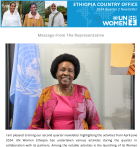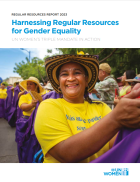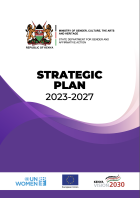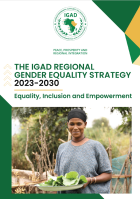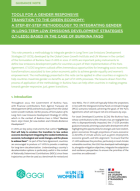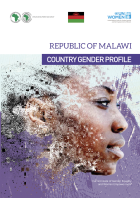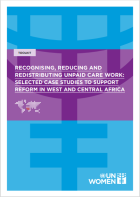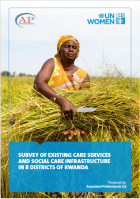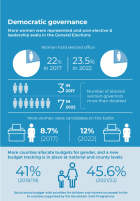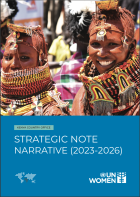1 - 20 of 50 Results
Pagination
Date:
The UN Women Kenya Annual Report highlights key achievements in advancing women’s empowerment and gender equality.
This report showcases progress in increasing women’s leadership and political participation, strengthening economic empowerment, eliminating violence against women and girls, engaging women in peace and security efforts, and enhancing planning and coordination.
UN Women Kenya remains dedicated to building a future where women are at the heart of developing resilient and sustainable communities.
Date:
This Care Framework highlights the context and challenges of women's unpaid care work in the West and Central Africa region. It also describes UN Women's approach to the care economy to address unpaid care within the context of the SDGs and the polycrisis in the region, and enabling gender equality and economic justice for rural and poor women.
Date:
UN Women Ethiopia has undertaken various activities during the quarter in collaboration with its partners. Among the notable activities is the launching of its WomenEconomic Empowerment Strategy. The strategy encapsulates UN Women’s vision of empowering women to thrive and economies to prosper. It aims to dismantle the systemic barriers that prevent women from fully participating in the economy.
Another important work done during the quarter is the continuation of our effort to ensure the participation of Civil Society organizations in the transitional justice processes. To this end, a two-day national workshop on creating space for the CSOs to participate in the implementation process of transitional justice policy in Ethiopia was held in June 2024. The workshop targets women leaders from non-governmental and CSOs and representatives of grassroots community groups aimed to assess gender sensitivity of the Transitional Justice (TJ) Policy recently adopted by Ethiopia’s Council of Ministers.
Date:
The report demonstrates how regular resources are invested to advance integrated triple mandate results. This includes explicit recognition of the expertise and leadership of UN Women staff, which relies on regular resources investments. Country, regional, and global examples illustrate how regular resources, often together with other resources, build momentum in synergy to deliver important advancements for women and girls.
Date:
The ultimate goal is that women and girls in Sudan benefit from gender-responsive humanitarian action and targeted assistance that responds to their basic needs, and from opportunities for their meaningful participation in peace, political and humanitarian processes.
Date:
The Publication is a detailed strategic plan for the period 2023-2-27. It highlights previous achievements, lessons and emerging issues that define the policy direction of the gender sector achieving a society free from gender discrimination and violence
Date:
The documentation of good and promising practices from the Social Institutions and Gender Index (SIGI) study will act as a guide to further gender equality in Tanzania.
Date:
Empowering women, building resilience: A UN Women and FAO Kenya project tackles climate challenges in arid regions. The initiative equips them with climate-smart agriculture skills, boosting incomes, nutrition, and their voice in agricultural policies. This collaborative effort fosters a future where women are key players in building sustainable livelihoods that thrive despite climate change.
Date:
This publication aims to identify the existing gender gaps in legal frameworks and policies to enable the integration of gender issues to increase the leadership roles of women and women with disabilities in local decision-making and ensure that they are equal beneficiaries of development interventions.
Date:
The main purpose of this publication is to establish baseline findings that will be used to guide the design and refinement of evidence-based project strategies and approaches to be applied in the Women’s Leadership and Economic Rights (WLER) Project.
Date:
This advocacy brief provides an overview of the trends in terms of Gender Based Violence (GBV) as a human rights violation in the southern Africa sub-region.
Date:
This publication outlines an approach that intends to translate IGAD's commitments to gender equality, inclusion, and empowerment into demonstrable results.
Date:
This note presents a methodology to integrate gender in Long Term Low Emissions Development Strategies (LT-LEDS), developed by the Global Green Growth Institute and UN Women in the context of the formulation of Burkina Faso LT-LEDS in 2022. The methodology presented in the note and the lessons learnt from Burkina Faso can be applied in other countries or regions to help countries maximize gender co-benefits as part of LT-LEDS processes.
Date:
The Malawi Counrty Gender Profile publication presents a review of existing gender issues identified through a review of documents and reports recently released. The generic purpose of Country Gender Profile is to strengthen national understanding and data on the advancement of international, regional and national commitments towards Gender Equality and Women's Empowerment.
Date:
Unpaid care work by women is one of the most important constraints they face in running their businesses or advancing in their careers. This toolkit presents a compilation of case studies that have been selected to support governments and civil society in dialogue around the implications of unpaid care work on women’s lives and countries development outcomes and for positioning (unpaid) care reform in a more central role in policies in the region.
Date:
Women’s unpaid care responsibilities are one of the main barriers preventing women from fully profiting from new jobs created in the green economy and is limiting their contribution to climate change mitigation and adaptation. Therefore, this brief calls for action on adopting appropriate public policies to ensure that women get an equitable share of green jobs; balancing men’s and women’s responsibilities for care; supporting private sector development in the care sector to scale-up promising solutions and increasing access to time-saving and energy-efficient infrastructure.
Date:
The likelihood of "economic disempowerment" is increased due to the unequal load of unpaid care duties placed on women and the human development outcomes of both the women and those being cared for may be impacted because women in the paid labor market may not be able to adequately fill their caregiving duties (Deepta & Zambelli,2017).
Date:
Our priority areas:
• Governance and participation in public life
• Women’s economic empowerment
• Ending violence against women and girls
• Women, peace and security, humanitarian action, and disaster risk reduction.
Date:
UN Women Kenya will focus on integrated approaches with seven systemic outcomes to address the root causes of inequality and affect broader systems change, across its thematic focus areas:
• Governance and participation in public life
• Women’s economic empowerment
• Ending violence against women and girls; and
• Women, peace and security, humanitarian action, and disaster risk reduction
Date:
Devolution has increased opportunities for women and other marginalized groups to participate and engage in county-level planning, budgeting, and implementation, and ensured an opportunity for county governments to integrate gender-responsive mechanisms in these same processes. The report synthesizes the impact on women and girls in devolved sectors of local government including education, health, agriculture, water and sanitation, and urban planning across the 14 counties of the United Nations Joint Devolution Programme.



